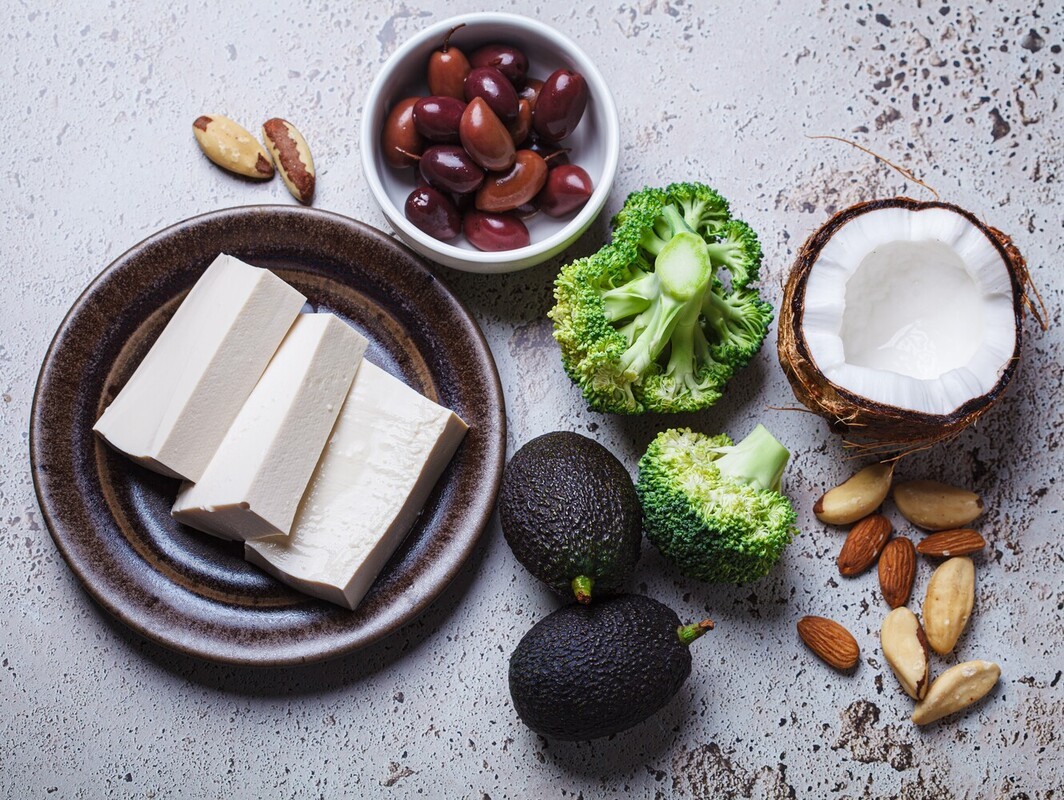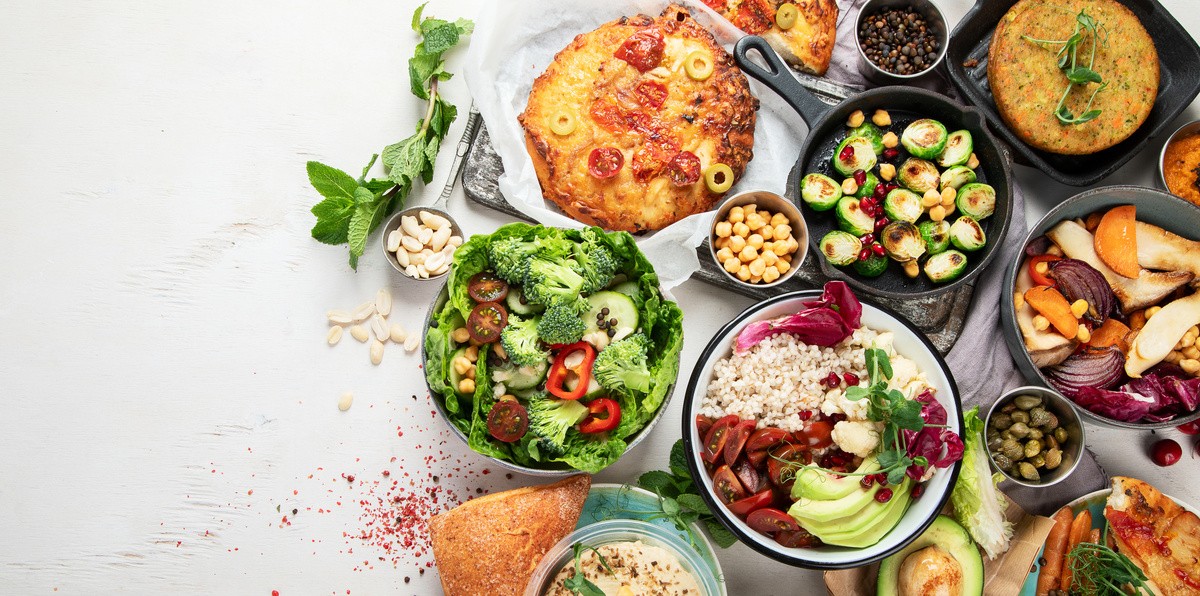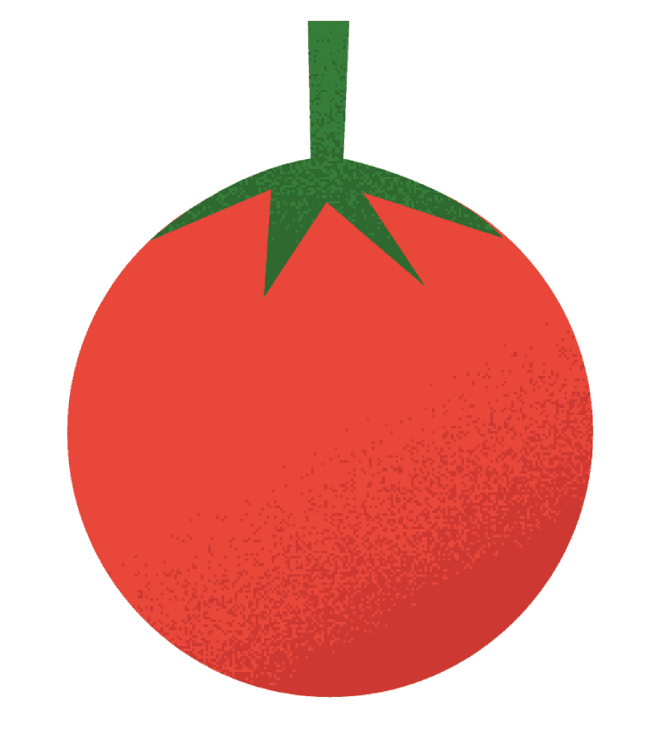At Berry Street, we’ve seen firsthand how confusing it can be to navigate a vegan weight loss meal plan—especially when weight loss feels elusive despite eating plant-based. We’ve worked with many clients who assumed giving up animal products would automatically lead to results, only to find themselves stuck and frustrated.
That’s why we created this guide: to take the guesswork out of the process and provide a balanced, simple, and actually satisfying approach to vegan weight loss.
7-Day Vegan Weight Loss Meal Plan
This vegan meal plan is designed to provide approximately 1,200–1,600 calories per day, balancing satisfaction, nutrition, and caloric control. Each day includes breakfast, lunch, dinner, and snacks. Remember every individual has different calorie needs and 1,200 calories may not be enough for you! We recommend talking to a registered dietitian to learn more about your individual energy requirements.
Day 1
Breakfast: Vegan Banana Bread With Peanut Butter
Start the day with one slice of vegan banana bread topped with a tablespoon of peanut butter. In our experience, this combo offers a fantastic mix of complex carbs, healthy fats, and a little protein.
Make the banana bread in advance using oats, ripe bananas, and a bit of maple syrup, then store it in the fridge or freezer.
Snack: Apple
A medium apple provides fiber and natural sweetness to keep blood sugar stable between meals. Just wash and bite. Pair with nuts or a nut butter to make this snack more filling. Simple, portable, and refreshing.
Lunch: Green Salad With Edamame, Beets, And Citrus-Lime Vinaigrette
A green salad with edamame and beets tossed in citrus-lime vinaigrette offers protein, fiber, and a burst of antioxidants. Use pre-cooked beets and frozen shelled edamame to save time. Whisk together lime juice, olive oil, and a dash of maple syrup for the dressing.

Snack: Clementine
A single clementine is juicy, hydrating, and perfect as a quick pick-me-up for those following a raw vegan meal plan. Peel and enjoy.
Dinner: Roasted Veggie And Tofu Brown Rice Bowl
The roasted veggie and tofu brown rice bowl delivers plant-based protein, fiber, and complex carbs. Roast seasonal veggies and tofu in olive oil and spices, serve over brown rice, and drizzle with a creamy cashew sauce blended from soaked cashews, lemon juice, and garlic.
Day 2
Breakfast: Apple-Cinnamon Overnight Oats
Apple-cinnamon overnight oats are a hearty, fiber-rich option. Combine rolled oats, almond or soy milk, diced apple, cinnamon, and chia seeds. Let it sit overnight and grab it in the morning.
Snack: Hummus With Cucumber Slices
Pair hummus with cucumber slices for a snack that’s crunchy, savory, and hydrating. Slice the cucumbers in advance and portion out the hummus for easy grab-and-go convenience.
Lunch: Citrus-Lime Tofu Salad
After testing it out ourselves, we’ve found that this citrus-lime tofu salad is light yet filling. Toss cubed baked tofu with mixed greens and a lime vinaigrette. This salad is high in protein and perfect for meal prep.
Snack: Plum
A plum brings antioxidants and just enough natural sugar to curb sweet cravings. No prep is required.
Dinner: Vegan Coconut Chickpea Curry
A bowl of vegan coconut chickpea curry over rice is comforting and nutrient-rich. Sauté garlic, onion, and ginger, then simmer with chickpeas, coconut milk, and spices. Serve over rice for a complete meal.

Day 3
Breakfast: Blueberry Almond Chia Pudding
Blueberry almond chia pudding is creamy and satisfying. Mix almond milk, chia seeds, vegan protein powder, and a touch of vanilla, then refrigerate overnight. Top with fresh blueberries in the morning.
Snack: Edamame And Cucumber With Vinaigrette
A small bowl of edamame and cucumber dressed in vinaigrette offers protein, fiber, and crunch. Toss them together and enjoy chilled.
Lunch: Roasted Veggie Bowl With Cashew Sauce And Black Beans
The roasted veggie bowl with cashew sauce and black beans is hearty and satisfying. Use leftovers from previous dinners to assemble a quick lunch bowl.
Snack: Plum
A plum is easy to carry and adds natural sweetness to the day. Great for a midday refresh.
Dinner: Cauliflower Fried Rice With Soy-Lime Roasted Tofu
Cauliflower fried rice with soy-lime roasted tofu is a flavorful way to end the day. Pulse cauliflower into rice-sized pieces, stir-fry with veggies and tofu, and season with tamari and lime juice.
Day 4
Breakfast: Apple-Cinnamon Overnight Oats
Apple-cinnamon overnight oats return for an easy, familiar start. They're high in fiber and naturally sweet. Meal prepping these saves valuable time.
Snack: Clementines
Two clementines offer vitamin C and hydration in one easy peel. A perfect refresher.
Lunch: Citrus-Lime Tofu Salad
Citrus-lime tofu salad makes a second appearance for variety without the extra prep. Reuse ingredients from earlier in the week for simplicity.
Snack: Blueberries
Half a cup of blueberries is an antioxidant-rich treat. No cooking is required—just rinse and enjoy.

Dinner: Stuffed Sweet Potato With Hummus Dressing
Stuffed sweet potato with hummus dressing is a warm, comforting meal. Roast sweet potatoes, then top with hummus, greens, and chickpeas.
Day 5
Breakfast: Vegan Banana Bread With Peanut Butter
Enjoy another slice of vegan banana bread with peanut butter for a balanced mix of carbs and protein. Perfect for busy mornings.
Snack: Edamame And Cucumber with Vinaigrette
Edamame and cucumber with vinaigrette is refreshing and filling. Make extra in advance for multiple snack portions.
Lunch: Mixed Greens With Roasted Vegetables, Tofu, And Cashew Sauce
Mixed greens with roasted vegetables, tofu, and cashew sauce is a vibrant, nutrient-packed meal. Use leftover components to save time and reduce waste.
Snack: Blueberries
A handful of blueberries keeps things light and adds a sweet, tart finish to your afternoon.
Dinner: Spicy Peanut Noodles With Edamame And Veggies
Spicy peanut noodles with edamame and veggies are full of flavor and satisfaction. Cook noodles, toss with peanut sauce, add veggies and edamame, and you're set.
Day 6
Breakfast: Blueberry Almond Chia Pudding
Blueberry almond chia pudding makes another appearance for a reliable, protein-rich breakfast. Pre-made options make mornings easier.
Snacks: Whole Wheat Toast with Hummus
Whole wheat toast topped with hummus is simple and satisfying. Toast the bread, spread on hummus, and enjoy.
Lunch: Spicy Peanut Noodles With Edamame And Cucumber
Leftover spicy peanut noodles with cucumber and edamame make for a tasty, no-fuss lunch. Serve chilled or at room temperature.
Snack: Clementine Or Apple Slices
Clementine or apple slices offer hydration and fiber. A convenient, naturally sweet snack.
Dinner: Stuffed Sweet Potato With Hummus Dressing
Stuffed sweet potato with hummus dressing returns, highlighting how versatile and meal-prep-friendly this option is.

Day 7
Breakfast: Vegan Banana Bread With Peanut Butter
Vegan banana bread with peanut butter remains a breakfast staple. Familiar and satisfying.
Snack: Edamame And Cucumber With Vinaigrette
Edamame and cucumber with vinaigrette provide that consistent crunch and protein boost. A reliable go-to.
Lunch: Green Salad With Edamame, Beets, And Citrus-Lime Vinaigrette
Green salad with edamame, beets, and citrus-lime vinaigrette brings the week full circle. Light, fresh, and nutrient-dense.
Dinner: Vegan BLAT Sandwich With Hummus And Carrot Sticks
The vegan BLAT sandwich is a fun and flavorful twist on a classic. Layer tempeh bacon, lettuce, avocado, and tomato on whole grain bread, and serve with hummus and carrot sticks on the side.
How To Meal Prep For A Vegan Weight Loss Meal Plan
Plan Ahead
According to our research, planning is the backbone of successful meal prep, whether it’s vegan meal prep or you’re following a weekly vegetarian meal plan.
Start by choosing your recipes for the week and writing a detailed grocery list. Make space in your schedule for one or two bulk prep sessions. Organize meals by priority—what gets eaten first and what can wait.
If planning feels overwhelming or you’re not sure where to start, connect with a Registered Vegan Dietitian through Berry Street. We’ll help you build a personalized 7-day vegan meal plan that aligns with your goals, taste preferences, and lifestyle.
Batch Cook Your Grains
Cooking grains like brown rice, quinoa, and oats in bulk saves time and stress later in the week. Once cooled, they store well in the fridge for up to five days and in the freezer for several weeks.
Use them as the base for bowls, salads, or quick breakfast options like overnight oats. This strategy ensures you always have a wholesome component ready to build balanced meals.

Pre-Chop Veggies
Chopping vegetables ahead of time can dramatically speed up your meal prep. Slice bell peppers, cucumbers, carrots, broccoli, and more, then store them in airtight containers in the fridge.
You’ll thank yourself when it’s time to cook. Prepped veggies are also more likely to be eaten as snacks or added to meals when they’re easy to grab.
Make Use Of Sauces And Dressings
Sauces bring excitement to meals and can keep your palate from getting bored. Prepare a batch of cashew cream, tahini dressing, or citrus vinaigrette to keep in the fridge. Most can last up to a week. Drizzle them over grain bowls, salads, or roasted veggies for quick flavor boosts.
Prep Snacks
Snacks are where many people go off track. Having healthy options prepped makes a big difference. Roast chickpeas, slice fruits, or divide hummus into single servings.
Pair them with cut vegetables or whole-grain crackers. Keep snacks front and center in your fridge to make healthy choices easy.
Cook Once, Eat Twice
Doubling recipes is a simple and effective meal prep technique. Make extra portions of dinners like lentil soup or curry and save the rest for lunch the next day. This not only saves cooking time but also reduces decision fatigue. Freeze extras in meal-sized portions to use later in the week.
Benefits Of A Vegan Diet Plan
Supports Weight Loss
A well-planned vegan diet focuses on fiber-rich foods like fruits, vegetables, legumes, and whole grains. These foods are low in calorie density but high in volume, which helps you feel full while consuming fewer calories.
That means it’s easier to stay in a calorie deficit without feeling deprived. For personalized guidance, connect with a Registered Weight Loss Dietitian through Berry Street and get a plan that fits your unique needs, whether you’re looking for a vegetarian diet plan or you’re going fully vegan.

Improves Heart Health
By cutting out animal products, a vegan diet naturally eliminates dietary cholesterol and reduces saturated fat intake. This shift can help lower LDL (bad) cholesterol levels and reduce blood pressure.
It’s a heart-smart way of eating that’s supported by numerous studies and endorsed by many health organizations.
May Lower Inflammation
A plant-based diet is full of antioxidants and phytonutrients. These compounds help combat oxidative stress and reduce inflammation in the body. Chronic inflammation is linked to many health issues, including arthritis, heart disease, and metabolic syndrome. A vegan diet can help keep it in check.
Boosts Digestion
Fiber plays a major role in digestive health. Vegan diets are naturally high in both soluble and insoluble fiber, which promote regular bowel movements and support a healthy gut microbiome. If digestion is a concern, a vegan diet might help ease symptoms and improve overall gut function.
Environmentally Friendly
Vegan diets have a lower environmental impact. Producing plant-based foods generally requires fewer resources than animal agriculture. By choosing vegan meals, you're reducing greenhouse gas emissions, conserving water, and supporting a more sustainable food system.
Encourages Mindful Eating
Vegan eating often requires label reading and intentional meal planning. This naturally promotes greater awareness of food choices. Many people find that this mindfulness carries over into other areas of health and well-being.

Can Be Cost-Effective
Many plant-based staples—like beans, lentils, oats, and rice—are budget-friendly. While specialty vegan products can add up, whole plant foods offer great nutrition at a lower cost. Shopping smart and planning meals in advance can stretch your budget while keeping your diet nutritious and varied.
Enhances Skin Health
A diet rich in fruits, vegetables, and healthy fats can contribute to clearer, more radiant skin. Antioxidants and hydrating plant-based foods help reduce acne and support skin cell regeneration. Many people notice improvements in their complexion after adopting a vegan diet.
Supports Blood Sugar Control
Whole plant foods, particularly those rich in fiber, help stabilize blood sugar levels. Vegan diets often have a lower glycemic index, which means slower and more consistent energy release. This can be particularly beneficial for those managing insulin resistance or type 2 diabetes.
Promotes Longevity
Studies have shown that plant-based diets are associated with lower risks of chronic diseases and increased lifespan. A diet built around whole plant foods supports long-term health and vitality. It's a sustainable way to nourish the body through all life stages.
Conclusion
A vegan weight loss meal plan can be simple, satisfying, and effective when it's well thought out. Throughout this article, we’ve shared a full 7-day plan, broken down meal prep strategies, and outlined the wide range of benefits a vegan lifestyle can offer.
From boosting digestion to lowering inflammation and supporting weight loss, the plant-based approach has a lot to offer—especially when it’s built on whole, nutrient-dense foods. With a little planning and the right support, it’s entirely possible to enjoy meals that are good for your body, your budget, and the planet.
Ready to take the next step? Find a Registered Dietitian covered by insurance through Berry Street to help you personalize your own vegan weight loss journey.









